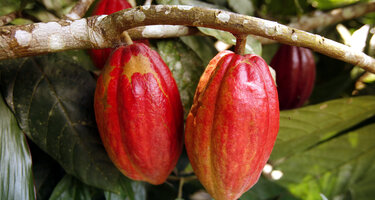Cocoa
The global cocoa sector is crucial to the livelihoods of approximately 5,5 million producers, 95% of whom are smallholder farmers. However, the sector faces significant challenges, including persistent poverty of cocoa farmers, which, among other factors, leads to child labor. In Côte d'Ivoire, the world's largest cocoa exporting country, 90% of cocoa farmers earn less than a living income, with households earning only 36% of what is needed. Fluctuating market prices and power imbalances in value chains worsen their income situation. Environmental challenges such as deforestation, crop failures, soil degradation, and biodiversity loss are compounded by climate change, further threatening cocoa production. The EU, as the largest cocoa importer, and Germany, as a leading producer of cocoa-based products, have a critical responsibility in addressing these challenges in collaboration with the many stakeholders involved in the cocoa sector.
The German Initiative on Sustainable Cocoa (GISCO), a multi-stakeholder platform including the German government, the confectionery industry, and civil society, aims to contribute to the fulfillment of this responsibility, and is committed to improving the livelihoods of cocoa farmers, conserving natural resources, and increasing cultivation and commercialization of sustainably produced cocoa. Additionally, projects like PRO-PLANTEURS, funded by GISCO, aim to ensure a sustainable income and better living conditions and to professionalize cocoa farming families, particularly focusing on women and youth.
Efforts like these are as well supported through international collaborations, such as the EU Sustainable Cocoa Initiative, to strengthen sustainability in cocoa production and support compliance with new regulations such as the EU Directive on Deforestation-free products (EUDR). The meta network Alliance on Living Income in Cocoa (ALICO) brings together stakeholders of the cocoa sector to contribute to a systemic change in the cocoa sector to ensure that farmers receive a living income.
